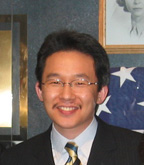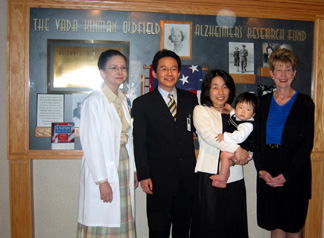 Shinji Sato, Ph.D., a post-doctoral research associate in UNMC’s department of pathology/microbiology, is this year’s recipient of the Vada Kinman Oldfield Alzheimer’s Research Fund Award.
Shinji Sato, Ph.D., a post-doctoral research associate in UNMC’s department of pathology/microbiology, is this year’s recipient of the Vada Kinman Oldfield Alzheimer’s Research Fund Award.
Presented April 19, the award is given annually to an individual with a promising new idea in Alzheimer’s research.
“We must slow the progression in those who already have the disease. We must prevent the development of the disease in future generations,” Dr. Sato said during the award ceremony. “This honorable award gives me a chance to be highly motivated and continue my dedication to Alzheimer’s disease research.”
 |
Shinji Sato, Ph.D., with his wife Etsuko, and son Hibiki. They are joined by Jane Potter, M.D., left, and Ardyce Bohlke, right. Bohlke presented the award. |
In January, Dr. Sato joined UNMC’s Center for Neurovirology and Neurodegenerative Disorders, where he works in the lab of Tsuneya Ikezu, M.D., a past recipient of the Oldfield award. Dr. Sato’s research currently focuses on novel human specific protein in Alzheimer’s disease.
|
|
Dr. Sato received his doctorate degree in molecular biology from the University of Tokyo Graduate School of Science in 1999. His thesis focused on a causative gene called Presenilin-1 on chromosome 14, which is correlated with early onset of familial Alzheimer’s disease in Jewish Ashkenazi families, as well as Japanese families. Dr. Sato did his post-doctoral training at the Brain Research Institute at RIKEN in Japan. In 2002, he began a post-doctoral position at the Division of Cell Cycle Regulation, Cancer Research Institute at Kanazawa University in Japan.
“I never expected to receive the award for the work I do every day,” Dr. Sato said. “This is a once-in-a-lifetime opportunity for me.”